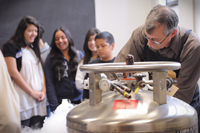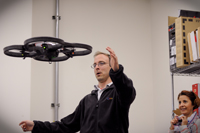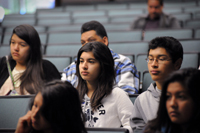SPLS Helps Teens Connect to College
April 24, 2013 About 40 high school students and their parents visited Harvey Mudd College on April 6 as part of Uncommon Good’s Connect to College Mentoring Program.
About 40 high school students and their parents visited Harvey Mudd College on April 6 as part of Uncommon Good’s Connect to College Mentoring Program.
They enjoyed a day filled with science demonstrations, an admissions talk, campus tour and a student panel hosted by HMC’s Society of Professional Latinos in STEMS (SPLS) student group.
The goal of the SPLS-sponsored event was to introduce the group of 9th- and 10th-graders to science, technology, engineering and mathematics (STEM) and to share what life is like for Latino students who major in STEM disciplines.
 “By meeting with the SPLS students, our students got to see that students from backgrounds similar to their own can achieve greatness and attend schools like HMC,” said Nancy Dufford, program coordinator for the Connect to College Mentoring Program, which inspires students to do well in school, so they can go to college and break the cycle of poverty. “It got them thinking about the kind of college they might want to attend and to think more seriously about their future. In fact, one of our students said she is going to meet with her guidance counselor to see if she is taking a rigorous enough curriculum.”
“By meeting with the SPLS students, our students got to see that students from backgrounds similar to their own can achieve greatness and attend schools like HMC,” said Nancy Dufford, program coordinator for the Connect to College Mentoring Program, which inspires students to do well in school, so they can go to college and break the cycle of poverty. “It got them thinking about the kind of college they might want to attend and to think more seriously about their future. In fact, one of our students said she is going to meet with her guidance counselor to see if she is taking a rigorous enough curriculum.”
SPLS club officers Alejandro Frias ’15, Madeline Goldkamp ’14, Jaclyn Olmos-Silverman ’13, Alberto Ruiz ’14 and Chris Zazueta ’14 helped with the event. HMC tour guides Daisy Hernandez ’15 and Natasha Parikh ’14 led the campus tours.
“We feel that reaching out to the community and making an impact is key to our club,” said Zazueta. “Our desire to fulfill our mission statement with regard to outreach to younger generations inspired us to hold the event.”
 HMC Assistant Dean for Institutional Diversity Angelica Ibarra presented a special session for the parents. Her talk, “Preparing for College,” shared how parents can identify their children’s learning styles, prepare them for college and position them for academic success, particularly in STEM education.
HMC Assistant Dean for Institutional Diversity Angelica Ibarra presented a special session for the parents. Her talk, “Preparing for College,” shared how parents can identify their children’s learning styles, prepare them for college and position them for academic success, particularly in STEM education.
“They had lots of question about the college experience, and they were surprised to learn that one of the most difficult aspects for students is asking for help,” said Ibarra. “We spoke a lot about considering STEM majors, because the parents had not previously considered these as options for their children.”
The students and parents also viewed presentations by physics Professor Peter Saeta and computer science Professor Zach Dodds. Saeta talked about physics and showed how to make ice cream using liquid nitrogen. Dodds did a computer science demonstration involving 3-D processing and interactive robots.
- More information about Uncommon Good and becoming a mentor
